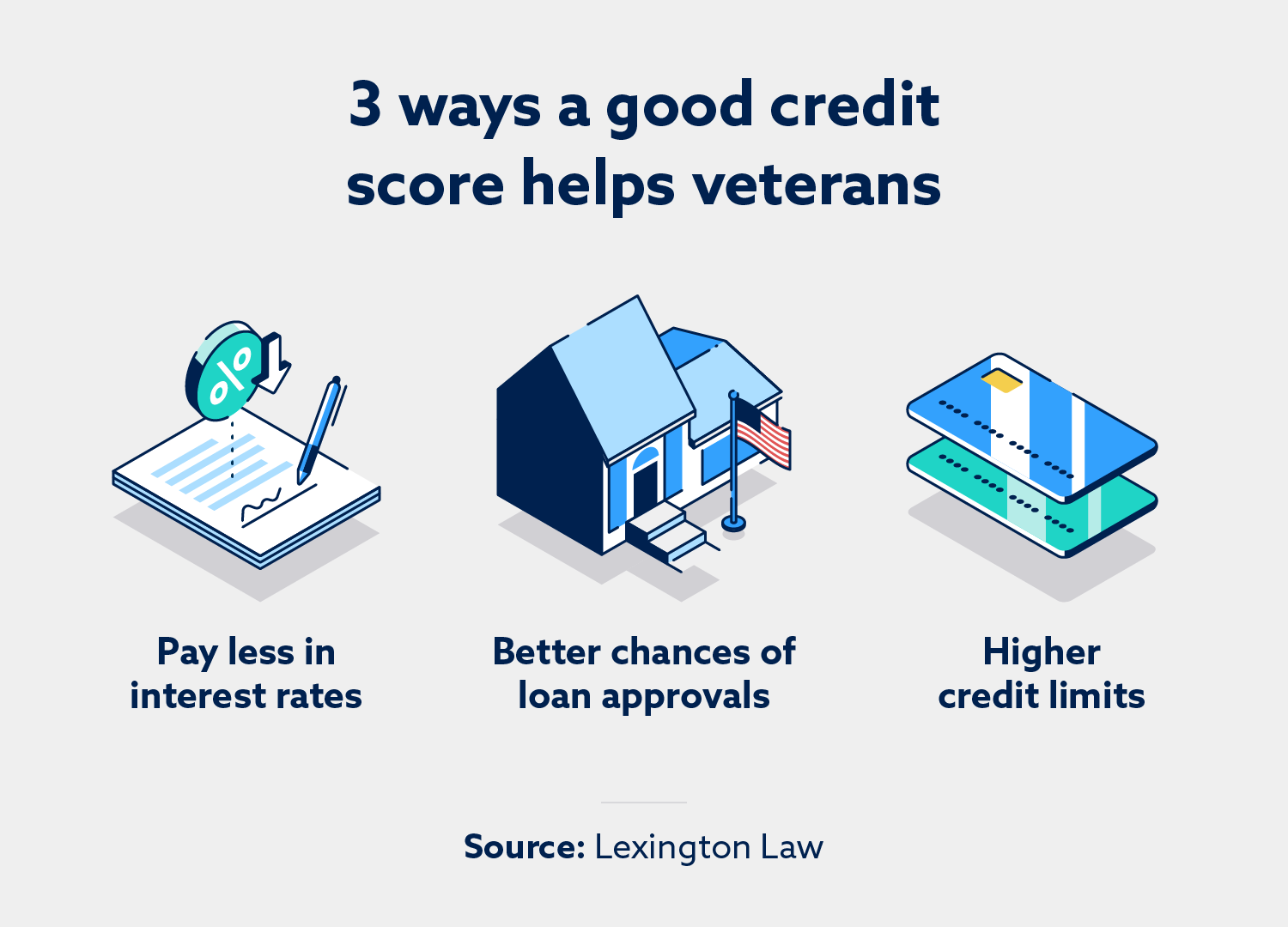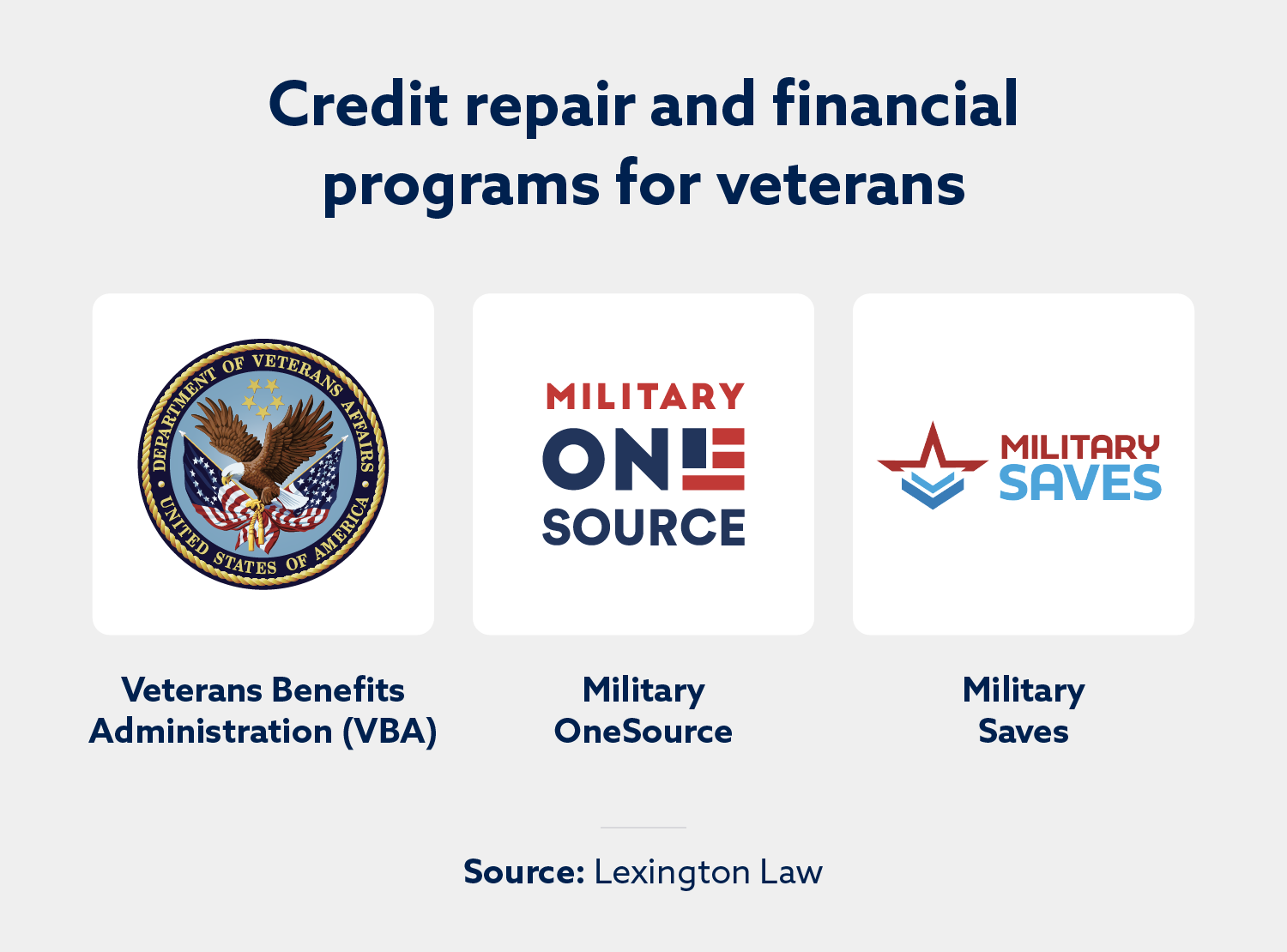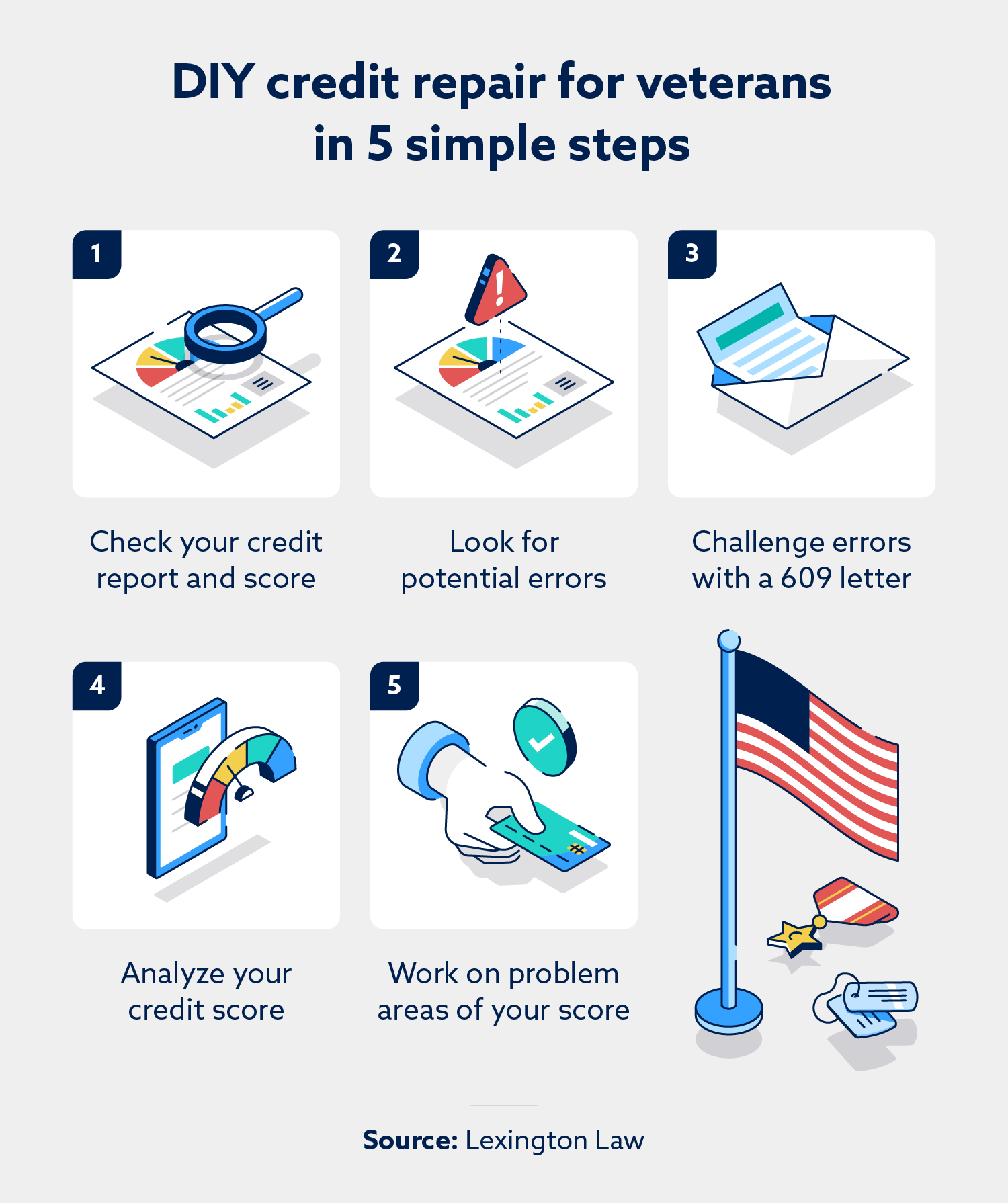
The information provided on this website does not, and is not intended to, act as legal, financial or credit advice.See Lexington Law’s editorial disclosure for more information.
There are over 18.3 million veterans in the United States and an additional 2.86 million service members on active duty. Service members dedicate their lives to our country, but many have poor credit, making it difficult to get a loan for a home or a vehicle. If you’re a veteran, a bad credit score can also cost you more money due to higher interest rates, but credit repair for veterans may be a solution.
Learning how to fix your credit score can help you and your family improve your financial well-being. There are steps you can take to repair your credit and programs that can help. In the guide below, we teach you how credit repair works and what you can do to work on your credit score.
Key takeaways:
- Credit repair for veterans involves improving your credit score by learning how credit works and focusing on problem areas of your credit report.
- In some cases, there are errors on your credit report that you can challenge to potentially improve your credit score.
- There are many nonprofit organizations and additional resources for veterans looking to repair their credit.
What is credit repair for veterans?
Credit repair is when you take certain actions toward fixing and improving your credit score. Your FICO® credit score is the primary scoring model lenders and other businesses use to assess your creditworthiness. The five weighted factors that make up your credit score include:
- Payment history (35 percent): How well you make your payments on time and in full
- Credit utilization (30 percent): How much you owe compared to your max credit limit
- Credit age (15 percent): The average age of your credit accounts
- Credit mix (10 percent): Your mix of revolving credit and installment loans
- New credit (10 percent): How often you apply for new credit accounts
Credit bureaus use your credit report to find information on these five areas to determine your credit score. To repair their credit, veterans can review their credit reports and work on specific areas that need improvement. This involves developing good financial habits and paying down debts.
Your credit report may also contain errors like misreported late payments, which you can challenge with the credit bureaus.
How can credit repair help veterans?
There are VA home loans that don’t have minimum credit score requirements, but it’s different when dealing with private lenders. So, if you go through a bank for a home loan, auto loan, personal loan or anything else that requires a credit check, you need a good credit score. Putting in the effort to repair your credit as a veteran allows you to have more choices and opportunities with your finances.
When veterans fix their credit, they’re able to save money and have more opportunities. Your credit score is a primary factor in determining where you live, how much you pay in interest and deposits and sometimes, it determines what kind of job you can get. Fixing your credit score can take time, but it can help you and your family buy the home of your dreams and save money for your future.

Additional credit repair programs for veterans
In addition to the NFCC, there are more credit repair programs that specifically work with veterans. By working with veterans and their families regularly, they understand the specific needs and challenges veterans face. Some of these organizations offer free credit repair services for veterans by providing debt relief options. The following organizations provide services and resources that may be able to help you fix your credit score:
- Veterans Benefits Administration (VBA): The VBA is an organization run by the U.S. Department of Veterans Affairs that helps veterans understand their benefits. They also provide many services to help veterans manage their finances. This includes beneficiary financial counseling, a fiduciary program and mortgage delinquency assistance.
- Military OneSource: Military OneSource offers many resources for veterans and their family members. They provide assistance with taxes, financial education resources, spouse employment and more. They also have financial counselors who help veterans manage their finances and debt.
- Military Saves: This nonprofit organization is dedicated to helping military members learn how to save money, reduce debt and manage their finances. It partners with a wide range of military banks and credit unions to help veterans improve their financial well-being.

Can you get a VA home loan with bad credit?
Regardless of your credit score, you can qualify for a VA home loan. Unlike private home loans, there’s no minimum credit score for a VA home loan. Should you choose to work with a private lender, the minimum credit score is often 500, but it may be higher depending on the lender and the loan amount. Eligibility requirements for a VA home loan include:
- Service status
- Time served in the military
- Discharge status
- Debt-to-income ratio
There are also additional benefits to VA home loans. Unlike private loans, there are no down payment requirements or repayment penalties. VA home loans often have lower interest rates than private home loans, so you can save on the total price of the home.
How long does credit repair take for veterans?
How long credit repair takes depends on the individual. When you have more issues with your credit score that are lowering your score, it can take longer to repair it. Some of the factors that can determine how long credit repair takes include:
- Your current credit score
- How many derogatory items are on your credit report
- Your current amount of debt
Some negative items on your credit report may take seven to 10 years to fall off your credit report, so this can increase the time frame. The length of time also depends on what score you’re trying to achieve.
For example, raising a score of 550 to 750 can take longer than raising it to 650.
5 steps to improving your credit health
Credit counseling organizations and other programs can help you with your credit repair, but there are some steps you can take on your own as well. Before focusing on specific areas of your credit score, there are some initial steps you should take:
- Step 1: Check your credit report
- Step 2: Look for potential errors on your credit report
- Step 3: Challenge potential errors
- Step 4: Analyze your credit score for areas that need improvement
- Step 5: Begin working on areas that are lowering your credit score
Below are some simple tips to help boost your credit score by focusing on the individual factors affecting your credit score:
- Make your payments on time
- Keep your credit utilization below 30 percent
- Have a good credit mix
- Try not to open too many new credit accounts
- Don’t close old credit accounts
If managing debt is a primary issue affecting your credit score, the following are some simple ways to begin paying down debt:
- Create a budget
- Consolidate your debt for a lower interest rate
- Find sources of extra income

Check your credit score for free today
Before you can repair your credit score, you need to know what it is. The best way to do this is to get detailed information about your credit score so you know exactly where to focus your attention. Here at Lexington Law Firm, we provide a free credit assessment that can help you get started with a free credit score, credit report summary and credit repair recommendation. Sign up for your free credit assessment today.
Note: The information provided on this website does not, and is not intended to, act as legal, financial or credit advice; instead, it is for general informational purposes only. Use of, and access to, this website or any of the links or resources contained within the site do not create an attorney-client or fiduciary relationship between the reader, user, or browser and website owner, authors, reviewers, contributors, contributing firms, or their respective agents or employers.
